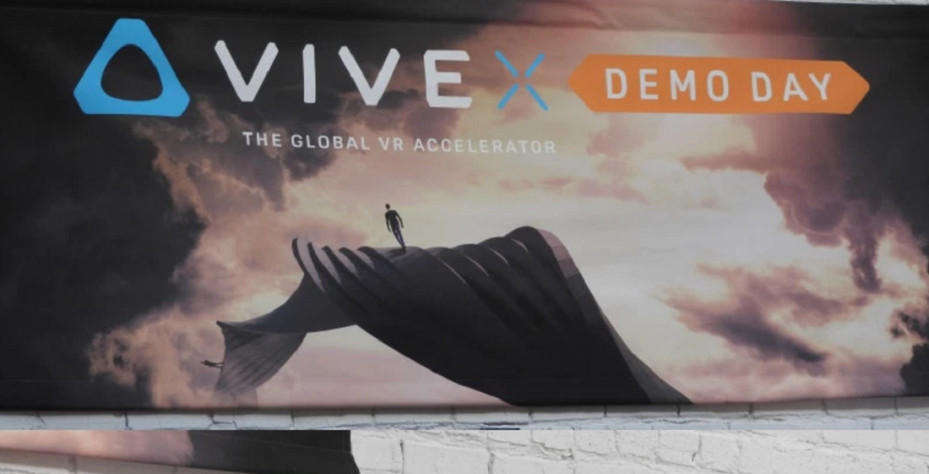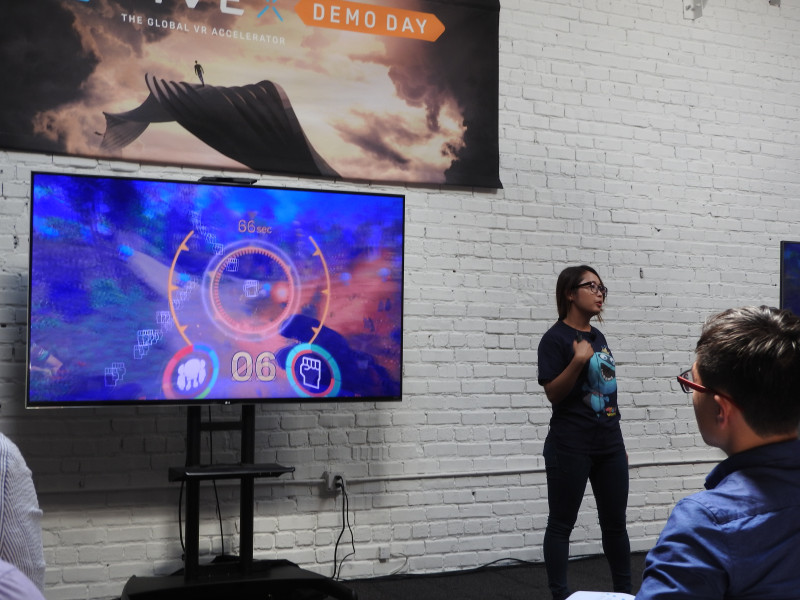
HTC has bet big on virtual reality with its HTC Vive VR headset. It continues to believe in the market, and it showed off technology from 26 new companies today at its Vive X accelerator demo day in San Francisco.
HTC has set up a $100 million fund to invest in VR companies, and it has made 60 investments so far across five different accelerator locations in China, the U.
S., Taiwan, and Israel.Here’s the enterprise VR companies:

Image Credit: Dean Takahashi
- Hyperfair is using VR to modernize human resources. It is using VR for recruiting based on avatars, and it is using VR for both internal and external company events. It enables thousands of concurrent users in a VR environment. Such events can be much more engaging in VR, according to Hyperfair. The company is focusing on large accounts.
- Mindesk is creating VR software for computer-aided design. It leverages VR to improve the performance and visualization that is possible with 3D modeling tools. VR can improve performance has much as 100 percent compared to 2D CAD software. It makes prototyping easier and collaboration more productive. It has already had 1,500 downloads and there are more than 100 alpha testers. HP is one of its first paying customers.
- Realiteer uses its WiseMind platform to treat psychiatric patients in VR. It tries to retrain your brain to recover normal functions of the body in the wake of some kid of accident. Few people keep up with their therapy treatments in real life, but patients are more interested in the “gamified” VR platform. So they adhere to their treatment better because of the VR immersion. It has been reviewed by more than 50 therapists. It has had 600,000 downloads. It sells software and hardware bundles to clinics, and the systems can be billed to insurance companies. Eventually, Realiteer will sell to consumers. The company is raising $1 million to conduct clinical trials and set up distribution.
- PlusOne builds interactive intelligent virtual tutors to train students in learning languages. The user can talk to an AI character who can communicate with the user and give feedback on things like pacing, pronunciation, and other tasks. It has been piloted in Japan and China. It is focused on the global online language learning market, a $54 billion opportunity.
- Opaque Space has created a technology dubbed Earthlight for creating 3D simulations for things like training astronauts in virtual reality for space missions. It is working with NASA to develop VR training tools for the next generation of astronauts. It hopes to work with private space companies, government agencies, and eventually consumers. It has demoed to more than 4,000 people so far. It hopes to raise $6 million.
- Snobal is a profitable VR company. That’s right. It is providing VR tools for businesses. It enables them to create, manage, and analyze their VR projects. It is targeting markets such as construction. It has patents for VR related to asset management, commerce, and engagement. It is hoping to raise $6 million.
- SoccerDream is focused on helping people learn how to play soccer using VR. Yes, some people try to do this by kicking a ball around. But that’s old-fashioned. In this case, players learn how to make plays and score goals, based on training tips in the VR app. It teaches physics, technique, and tactics. Right now, only a few top teams have this kind of training, the company said. SoccerDream wants to scale this training to the 24 million U.S. soccer players and others around the world. It uses experts such as members of Chelsea F.C. and other teams.
- Xitaku is focused on augmented reality applications for industrial and medical fields. It has created ARcore, the core camera component of video pass-through systems that film scenes and deliver good quality video. It makes any VR screen AR-enabled. It had revenue of $500,000 in the last year thanks to customers such as the Japanese government.
Here’s the companies doing games:

Image Credit: Dean Takahashi
- Subdream Studios is making VR games with a social twist. It was founded by Jikhan Jung and the team spun off from Colopl. It has already raised $1.55 million. Jung previously worked at companies such as Gala-Net and Kabam. Within five months, it released two games, including Mega Overload, which is like a VR version of the old arcade game Galaga (which consumed a lot of my quarters when I was young). It also created Kingdom Watcher with funding from Samsung. The company is doing both VR and mobile games as it awaits growth of the VR market. It is looking to raise another $450,000.
- The Rogue Initiative is helping Hollywood get into VR. It is creating multiplatform content, ranging from games to non-game VR firms. Michael bay is a co-owner of the company, and they’re working on something based on a big intellectual property (still secret). The first project is Crowe: The Drowned Armory. It’s a VR game with fancy 3D-animated graphics of monsters and heroes in a fantasy world. The company’s staff includes Pete Blumel, CEO, former developer at Infinity Ward on Call of Duty games. It has raised a first round and is looking for more money.
- Pop Match is a new startup from Chip Sineni and Andy Kniaz, and their team created The Brookhaven Experiment, a groundbreaking VR game. It is making a team-based VR sci-fi shooter called Rushfire,…
The post 26 VR startups debut at HTC’s Vive demo day appeared first on FeedBox.